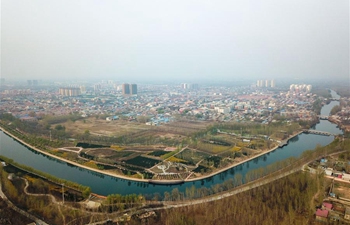BEIJING, April 4 (Xinhua) -- China on Wednesday dismissed the idea that political motives were behind its countermeasures against U.S. soybean imports after the U.S. administration proposed tariffs on billions of dollars of Chinese products.
"Business is business," Vice Finance Minister Zhu Guangyao said at a press conference. "We should analyze the challenge we face and the way we deal with it from the perspective of the economy."
He made the remarks in response to a reporter asking whether China intends to hit U.S. President Donald Trump's political base in agricultural states by putting soybeans at the top of a U.S. product list to be subject to higher Chinese tariffs.
"We are forced to bring forward the product list, and there are grounds for the specific items and their order on the list," Zhu said.
U.S. soybeans sold to China account for 62 percent of its total soybean exports, with 32.85 million tonnes of soybeans exported to China last year, or 34.4 percent of China's total imports, according to Zhu.
While U.S. farmers can benefit from healthy Sino-U.S. economic ties, the export amount to China was too big, he said.
Chinese farmers have petitioned industry associations that U.S. government subsidies hurt the interests of Chinese soybean growers, and China must respect its farmers' demands, Zhu told reporters.
China on Wednesday unveiled the list of products, worth 50 billion U.S. dollars, imported from the United States that will be subject to additional tariffs of 25 percent, including soybeans, automobiles, and chemical products.
The move was taken after the U.S. administration announced a proposed list of products covering Chinese exports worth the same amount with a suggested tariff rate of 25 percent.
"The product lists have not come into effect yet. Now that the two sides have put the issues onto the table, it's time for negotiations and cooperation," Zhu said. "The prerequisite for negotiations and cooperation is mutual respect, not one side recklessly forcing conditions on the other."
The two sides should return to negotiations and solve the trade disputes in a pragmatic and constructive way to cement Sino-U.S. economic ties and benefit the people of the two countries, including soybean farmers, according to Zhu.
He thanked U.S. soybean growers and the American Soybean Association for calling on the U.S. administration to protect Sino-U.S. economic ties.















